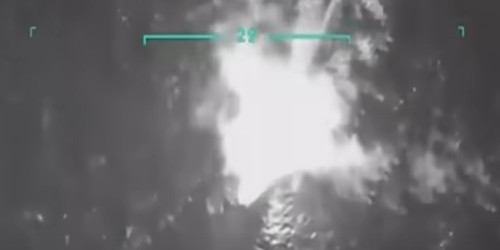
On September 2, the US government claimed that military operators acting on its behalf murdered 11 foreign nationals aboard a boat in international waters off the coast of Venezuela.
I say “claimed” because Venezuelan communications minister Freddy Ñáñez suggests that a video of the murders released by the US government is an AI-generated “deepfake.” Regimes lie, and it’s not obvious which regime is lying in this particular instance.
But let’s assume that US regime officials, including US secretary of defense Pete Hegseth and US secretary of state Marco Rubio, were truthful in their claims.
If so, it’s reasonable to also assume they’re truthful when they claim that these 11 murders are just the start of a “campaign,” and that the US government intends to “blow up and get rid of” (per Rubio) even more victims.
When someone credibly confesses to murder, announces an intent to commit further murders, and clearly possesses the means to do so, it seems to me that whatever law applies should be brought to bear.
Under 18 U.S. Code § 1111, “Within the special maritime and territorial jurisdiction of the United States, Whoever is guilty of murder in the first degree shall be punished by death or by imprisonment for life; Whoever is guilty of murder in the second degree, shall be imprisoned for any term of years or for life.”
Said jurisdiction is defined in 18 U.S. Code § 7. It includes any vessel or aircraft belonging in whole or in part to the United States, meaning that the military personnel involved in the murder mission are themselves criminals … IF the law is applied.
Similarly, the entire chain of command, all the way up to US president Donald Trump (who has publicly admitted to approving the crime) are clearly on the hook for “conspiracy to murder” under 18 U.S. Code § 1117 … IF the law is applied.
Unfortunately, the US Supreme Court ruled last year that presidents enjoy immunity for all “official acts,” even illegal ones like, say, ordering 11 murders. So Trump himself is as unlikely to be held accountable for this atrocity as for other crimes he’s ordered, such as the murder of eight-year-old American girl Nawar Anwar al-Awlaki in 2017.
But what about Hegseth, Rubio, and the various military officers who must have been involved in planning and directing the operation?
Holding them legally culpable may be as unlikely as bringing Trump himself to justice, but it’s theoretically possible. So far as I can tell there’s nothing to prevent a grand jury from indicting some or all of them.
The biggest hurdle to get over is that the US Department of Justice answers to Trump and likely won’t ASK a grand jury to do any such thing.
So, once again, the US government will get away with murdering anyone it announces is a “terrorist,” “drug smuggler,” etc., without having to prove the charges.
The only unique aspect of this particular mass murder is that its sole purpose seems to have been to distract us from the matter of Donald Trump’s relationship with Jeffrey Epstein.
Did it work?
Thomas L. Knapp (X: @thomaslknapp | Bluesky: @knappster.bsky.social | Mastodon: @knappster) is director and senior news analyst at the William Lloyd Garrison Center for Libertarian Advocacy Journalism (thegarrisoncenter.org). He lives and works in north central Florida.
PUBLICATION/CITATION HISTORY


